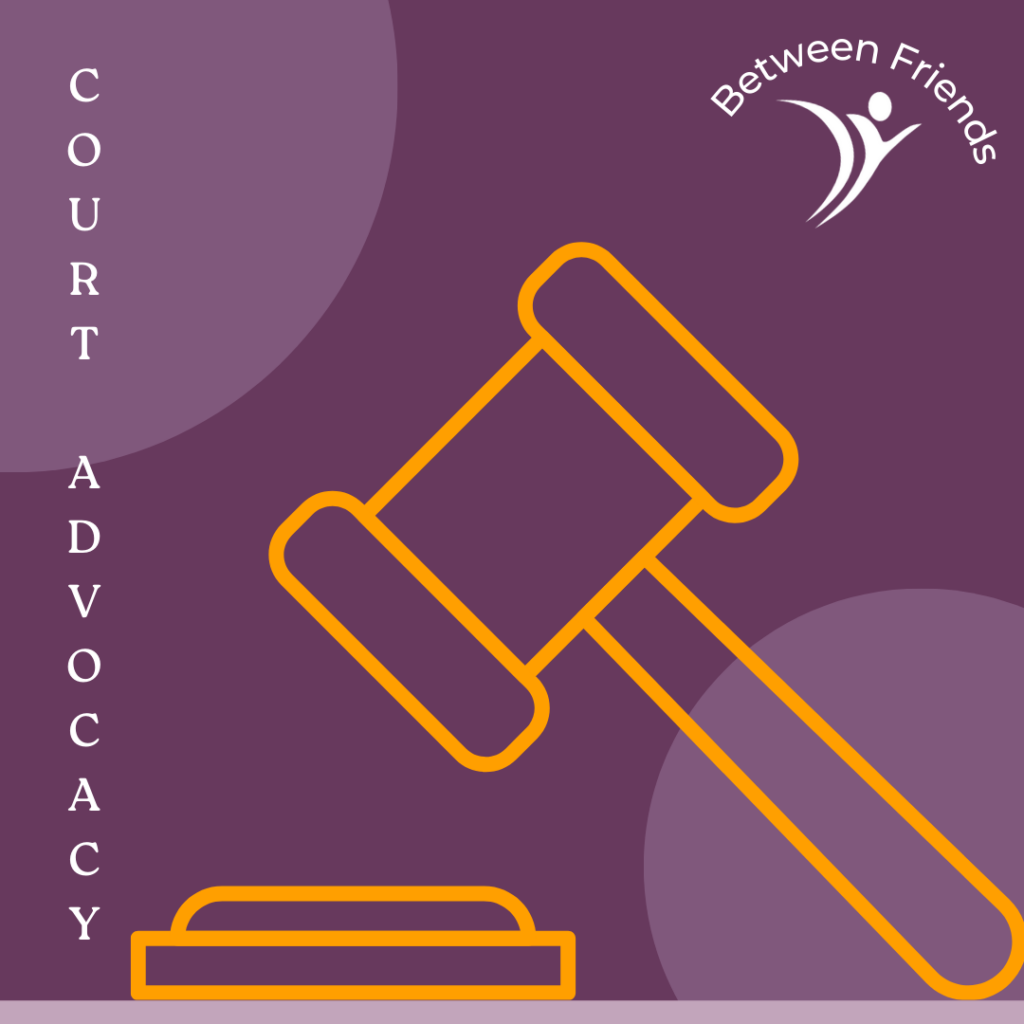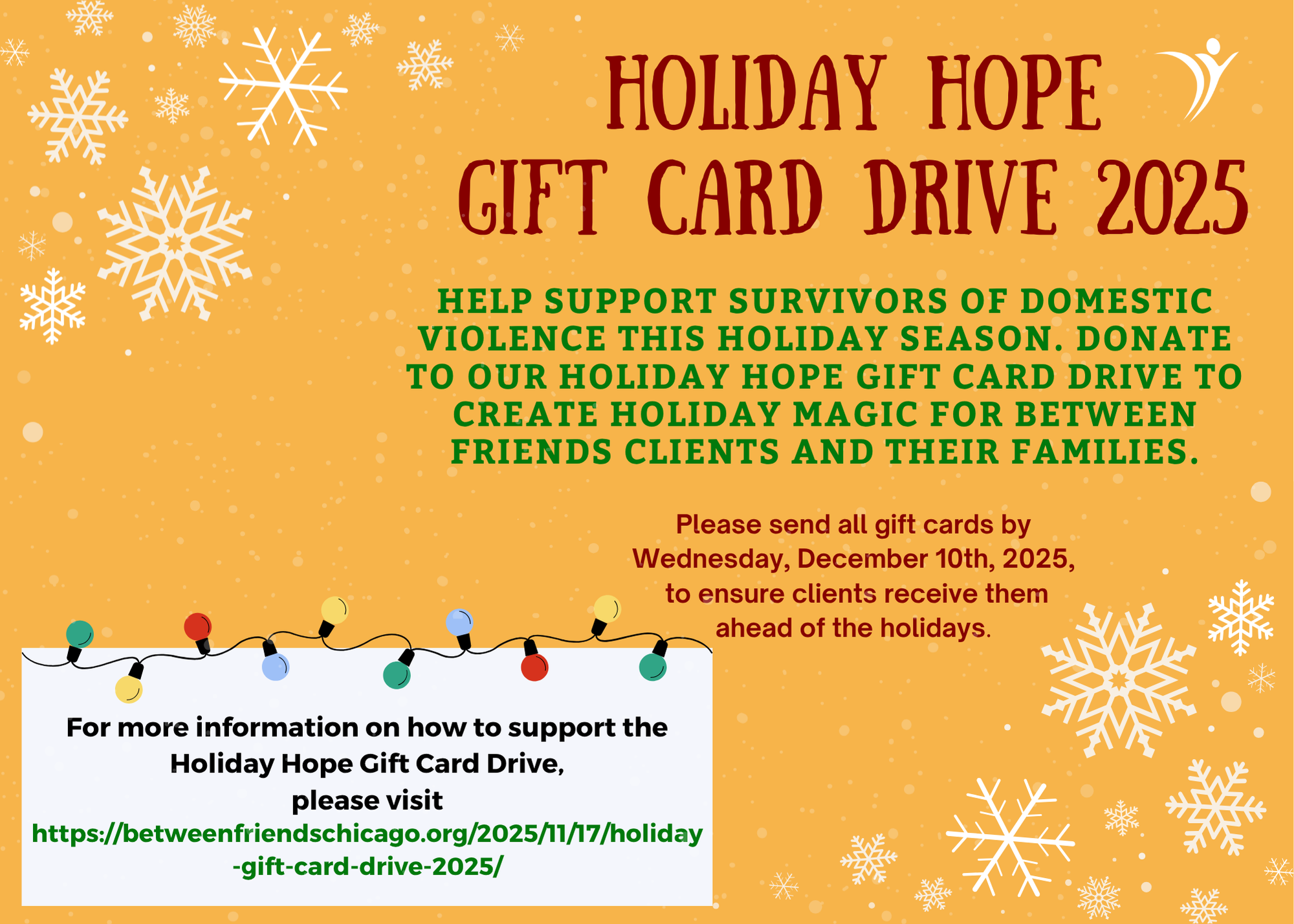At Between Friends, our programs focus on survivors’ needs, empowerment, and self-determination. As part of the healing process, our goal is to provide information and support to clients so that they can make their own choices for themselves and their families in order to keep themselves safe. We regularly tell clients that they know their situation best and they are the best ones to decide what will keep them safe. In addition, we provide options for clients to choose from and determine which services fit their needs. We can help them feel confident in their decisions by exploring their potential next steps. Each survivor’s journey is unique to them and pursuing an Order of Protection is one avenue survivors may take as they seek to build or reestablish safety.
Navigating the court system can be challenging and understanding the remedies afforded to survivors through the Illinois Domestic Violence Act (IDVA) of 1986 can be complicated. If a survivor chooses to access our Court Advocacy Program, Between Friends has several Court Advocates who can help every step of the way. They can assist survivors in understanding their rights under the IDVA and they can explore options, helping a survivor to determine which actions they can take. In Spanish, English, and Portuguese, Between Friends’ Court Advocates explain how to obtain an Order of Protection, which is a document issued by a court and signed by a judge that helps to protect a survivor from harassment or abuse. Orders of Protection restrict a family member, spouse/partner, or former spouse/partner from engaging in harmful or threatening behaviors. Sometimes, an Order of Protection will restrict the person who chooses to cause abuse from having any contact with the survivor. In other cases, the Order may simply restrict the person who chooses to cause abuse from engaging in abusive behaviors while the parties are in contact. Violating an Order can result in additional criminal charges and penalties. Between Friends Court Advocates can assist with paperwork needed to file an Order of Protection, they can accompany survivors to court to provide emotional support, advocate on a survivor’s behalf, and clarify complex legal information and processes. Court Advocates at Between Friends support adult survivors navigating the justice system as well as teen survivors, if the teenager is accompanied by an adult.
Our Court Advocates know that filing an Order of Protection is time consuming and requires lengthy paperwork. Because the process can be exhausting and complicated, our Advocates are there to answer questions and provide emotional support. According to our Court Advocacy team, a common misconception about Orders of Protection is that a police officer must be present in the courtroom during the hearing. In reality, all a survivor needs to file an Order of Protection is information (such as a name, address, etc.) about the person they are filing against. If the Order of Protection is denied, nobody – except the survivor, judge, and Court Advocate – will know about it, including the individual they filed against. This is important as survivors consider their unique safety concerns.
Domestic violence hearings may be held in a civil or criminal court—and sometimes both—depending on the severity of the abuse and the ways in which the survivor is harmed. Our Court Advocates are able to assist with both criminal and civil cases at the Circuit Court of Cook County’s Third Municipal District Courthouse in Rolling Meadows and the First Municipal District Domestic Violence Courthouse in downtown Chicago. Clients come from all over the Chicagoland and are referred by partner agencies, police, schools, therapists, and resource officers. All referrals are appointment-based, but our team also supports walk-ins.
In addition to our court-based services, Between Friends offers free legal clinics in which domestic violence survivors meet with volunteer family attorneys who provide legal advice. In these one-on-one consultations, attorneys answer questions about Orders of Protection, divorce proceedings, child support, child custody, and other family law and immigration issues. Legal clinic volunteer attorneys provide legal advice only – not legal representation. For more informaiton about our legal clinics, please click here.
Between Friends is dedicated to preventing domestic violence and ending the cycle of abuse by equipping our communities with the tools necessary for everyone to feel safe and equal in their relationships. Our Court Advocacy services are central to our mission and we are grateful to our Court Advocacy team and volunteer attorneys for their dedication and support.


